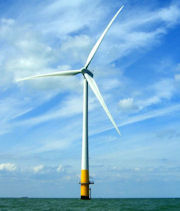by James A. Bacon
Last week Gov. Bob McDonnell rolled out the 2012 energy policy and budget initiatives that he hopes to shepherd through this year’s General Assembly. The proposed measures fall far short of the governor’s lofty rhetoric of making Virginia “the energy capital of the east coast.” But that, as I shall explain below, is probably a good thing.
The press release laying out the legislative package provides lengthy quotes from McDonnell, Lt. Governor Bill Bolling and senior legislators in support of a job-creating “all of the above” energy strategy. As the press release explains, “The governor is leading in the push to develop offshore energy, supporting expansion of renewables, and advocating on behalf of traditional fuels including coal, natural gas, oil and nuclear energy in order to secure an adequate supply of affordable, reliable energy for Virginia’s future.”
That makes total sense to me. Other than its significant coal production in far Southwest Virginia, the Old Dominion is a laggard in energy production — we are a net importer of electricity. Producing more energy is a good way to create jobs and bolster the tax base. Just one problem. There is little in the energy package that would actually boost energy production. Even if we assume that all nine measures are passed, Virginia won’t get any closer to becoming the “energy capital of the east coast,” a title that is far more likely to fall to West Virginia, Pennsylvania or some other state cashing in on the Marcellus Shale natural gas boom.
One measure would make it easier for utilities to develop the infrastructure to supply natural gas to economic development projects. A companion measure would make it easier for electric utilities to gain regulatory approval for 138kv transmission lines used for economic development projects. Both of these appear to be aimed more at facilitating job-creating economic development deals than boosting energy production, although the natural gas provision supposedly would increase the market for Virginia natural gas.
The package also contains two measures related to energy efficiency. One would promote “customer engagement tools” that would result in measurable and verifiable energy savings. The press release did not elaborate upon what kind of “tool” was being considered. Smart meters, perhaps? Another bill would allow biomass-fueled cogeneration projects to trade “renewable energy certificates” to the power company buying its electric power and credit them toward its mandated use of alternate fuels. Yet another measure would allow utilities to credit research on alternate energy toward their mandated use of renewable energy.
The governor also proposes:
- Allocating $500,000 in FY 2013 to develop data regarding resource availability in the federally designated “wind energy area” off the Virginia coast.
- Creating an Alternative Fuel Vehicle Conversion fund to help finance the conversion of the state fleet to alternative fuel vehicles.
- Advancing mine safety by requiring mine operators to submit planned mining maps earlier in the regulatory process.
- Allocating $300,000 yearly to strengthen the oil and natural-gas permitting process.
Conspicuously absent from the list was any mention of developing Virginia’s uranium reserves. Although mining a mother lode of uranium in Pittsylvania County undoubtedly would be an economic development boon for Southside Virginia, McDonnell was properly cautious in stating, after the release of a National Academy of Sciences report, that public safety should trump economic considerations.
Also absent was any nod toward embracing more energy-efficient human settlement patterns and transportation systems as a conservation strategy. But that hardly comes as a surprise. McDonnell has never evinced an awareness of the energy/land use connection. Former Gov. Tim Kaine is the only Virginia governor who ever has.
The hidden good news here is what McDonnell is not doing. He is not proposing to spend a lot of state tax dollars subsidizing the pet causes of energy interests. He is not trying to pick energy winners and closers.
I have lambasted President Obama for squandering billions of dollars on uneconomical alternate energy projects like Solyndra. It would be equally wasteful for McDonnell to try playing venture capitalist at the state level. Fortunately, he has enough sense not to. If we can just persuade him to drop the “energy capital of the East Coast” hype, Virginia would be even better off.



